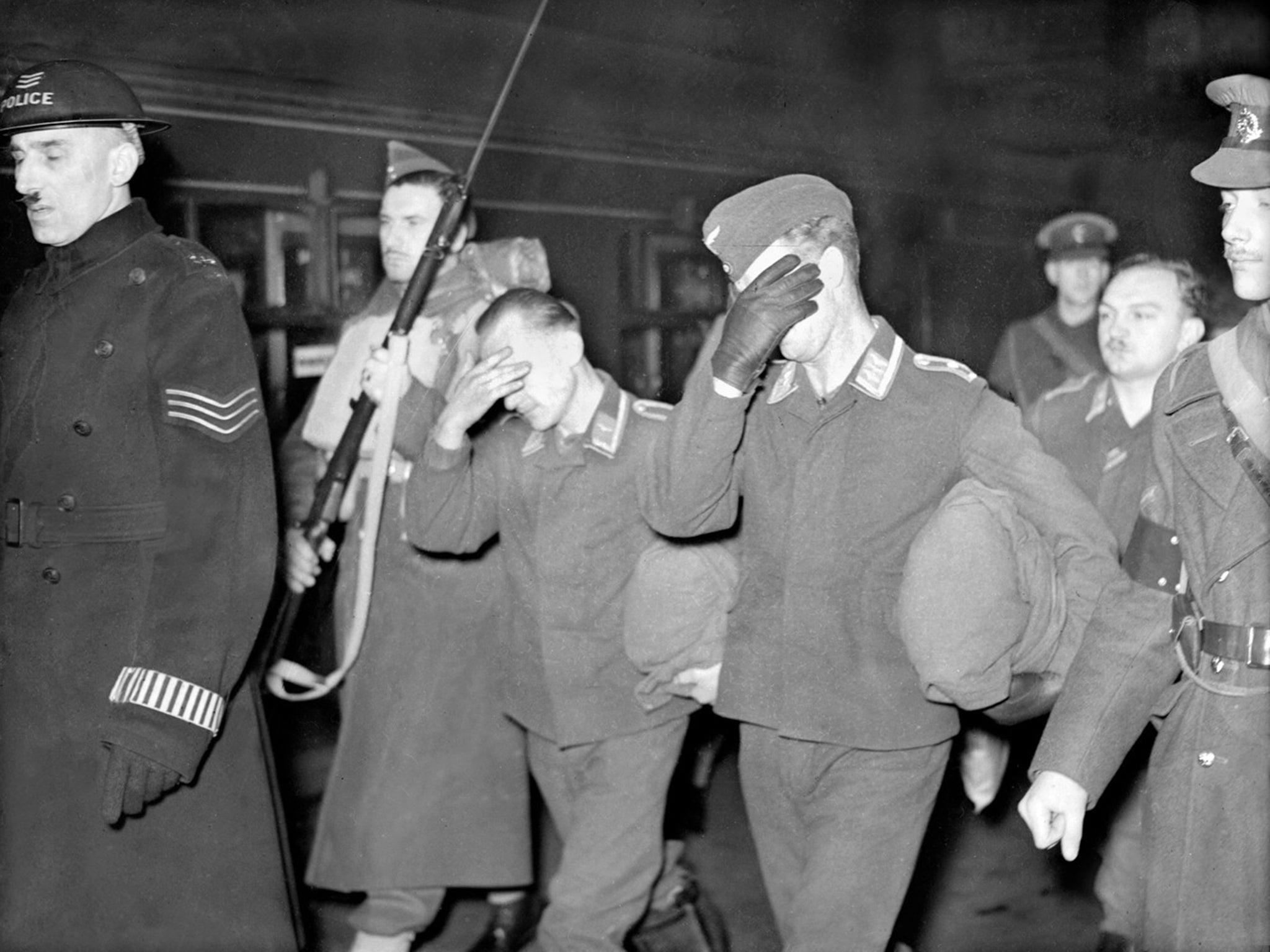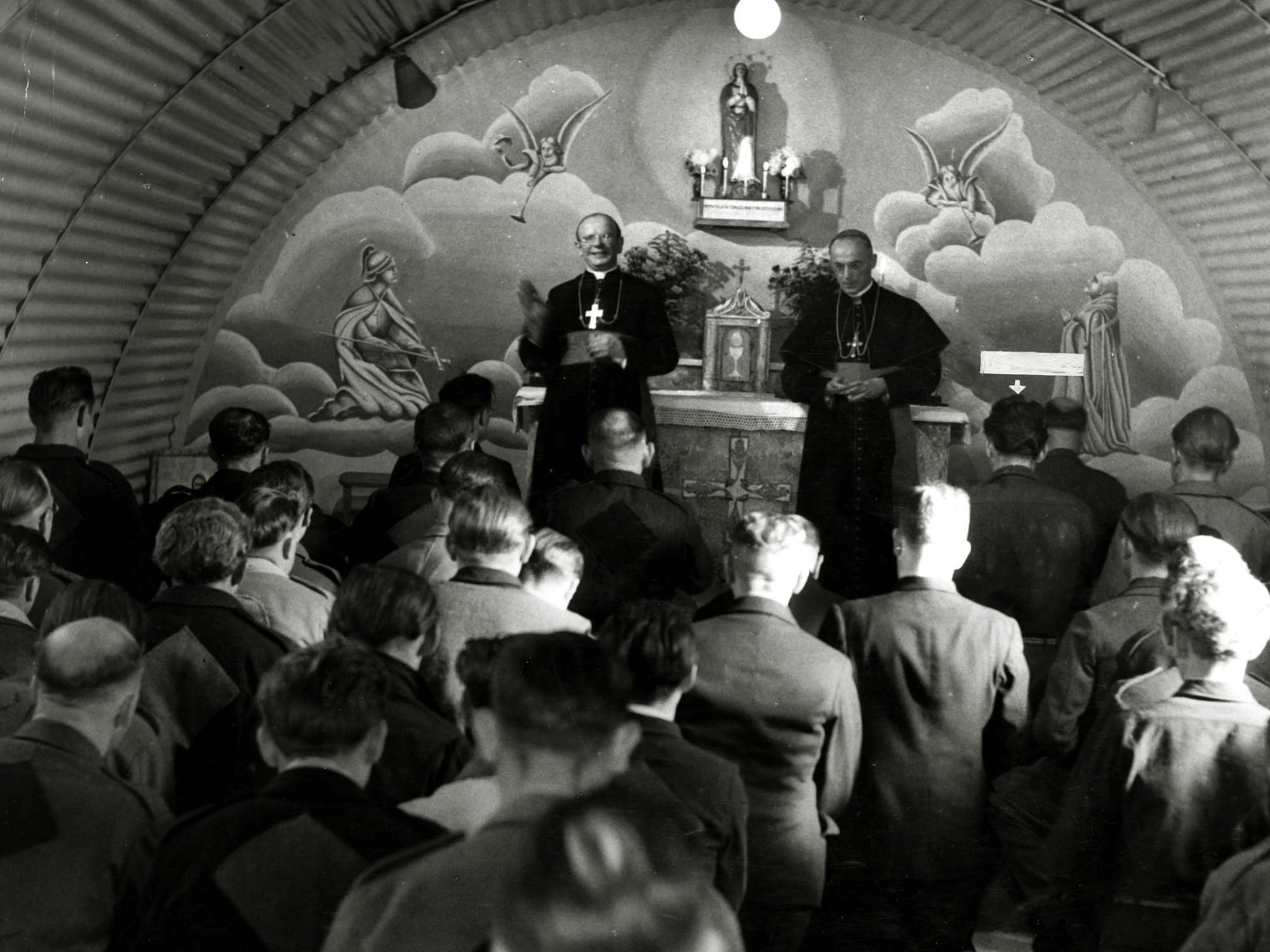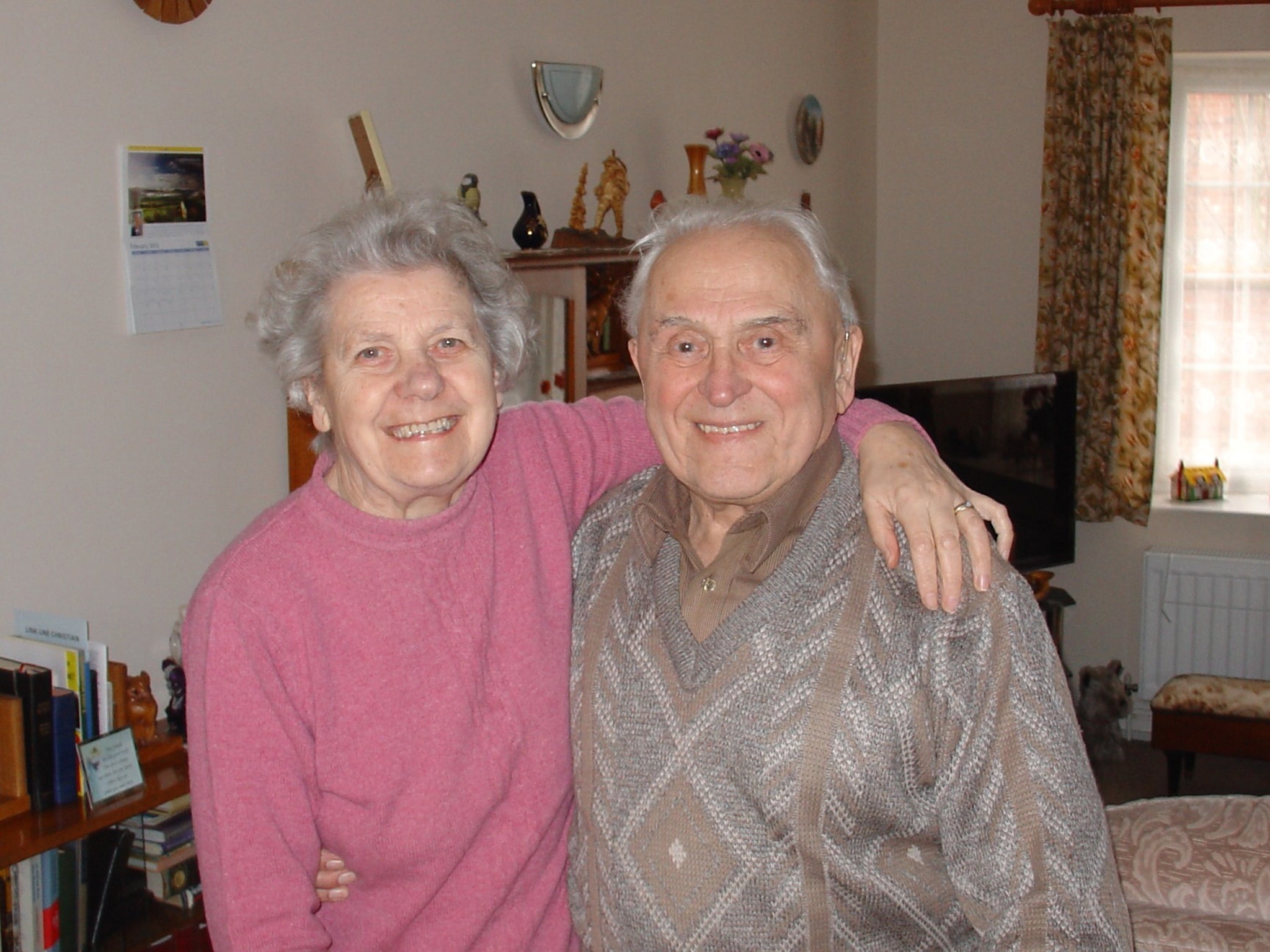The day that Deutschland died: Retracing the fate of captured Axis soldiers at the end of WW2
On 1 May 1945, the world learned of Hitler's suicide and ordinary Germans lost all hope - as their captured comrades in Britain already had. But, says Robin Quinn, despite early misgivings, by 1947 victors and POWs had earned each other's respect

Your support helps us to tell the story
From reproductive rights to climate change to Big Tech, The Independent is on the ground when the story is developing. Whether it's investigating the financials of Elon Musk's pro-Trump PAC or producing our latest documentary, 'The A Word', which shines a light on the American women fighting for reproductive rights, we know how important it is to parse out the facts from the messaging.
At such a critical moment in US history, we need reporters on the ground. Your donation allows us to keep sending journalists to speak to both sides of the story.
The Independent is trusted by Americans across the entire political spectrum. And unlike many other quality news outlets, we choose not to lock Americans out of our reporting and analysis with paywalls. We believe quality journalism should be available to everyone, paid for by those who can afford it.
Your support makes all the difference.The British people welcomed Victory in Europe with a display of unaccustomed rejoicing. Civilians thronged the streets and linked arms with strangers – dancing, cheering, weeping tears of relief and happiness. And the five million plus Britons in uniform could at last look forward to a reunion with their loved ones.
But it was a different story for 180,000 German prisoners of war detained behind barbed wire in 1,000 camps the length and breadth of the UK. The majority of these men had been captured in Northern Europe following the Normandy invasion: many were young conscripts or older men, thrown into the battle as a last desperate measure – reluctant fighters who had seen for themselves that Germany was losing the war. Although defeat was by no means unexpected, it still came as a bitter blow. On 8 May 1945, the POWs were ordered to assemble on the camp parade ground. News of the Allied victory was read out to them and as one recalls: “The camp stood absolutely still and in silence, momentarily stunned by the baldness of the announcement, and they didn’t know how to take it, or what reaction was expected of them. Someone shouted, ‘Bloody good job! Now perhaps we can all go home’.” But most of them knew it could never be that easy.
“When the war was over they said they wanted to ‘stamp out militarism’,” a former SS member explains. “We were told that the Waffen-SS would have to be imprisoned for 20 years.” Another German wrote in his diary: “I am incapable of expressing in words how every German feels. So end almost six years of self-sacrifice on the part of the German people. Something we never imagined could happen has turned into reality.”

The German POWs in Britain quickly realised that their counterparts – captured Allied servicemen in German custody – were being released at that very moment. The surrender meant that the victors could now deal with German prisoners as they saw fit, without fear of retaliation. And the prisoners feared the worst. “When the war was over,” one recalls, “we thanked God that it was finished and we were happy to be alive, but we wondered what was going to happen now. Germany had lost and they could do whatever they liked with us. And we thought they’d take it out on us.”
News of the Nazi concentration camps had already reached Britain in the weeks leading up to VE Day. Civilians watched in horror as newsreel footage of the camp at Belsen appeared on the screen at their local cinema, turning an evening at the pictures into a shocking spectacle that would give them nightmares for weeks. The German POWs were forced to watch the film in their own camp cinemas. Sceptics among them greeted the images with derision: “A really crude, cheap bit of propaganda. Lampshades made of human skin!” Others did believe that the Nazis were capable of such things, though the scale of the suffering their leaders had inflicted on others was hard to take in. “For many days after seeing these films we were all very subdued and distressed [and] most of us were quite unable to come to terms with the horrific sights we had been shown.”
Soon after the concentration-camp film was shown, the prisoners’ rations were reduced and they were forced to work longer hours. Britain blamed these measures on a general food shortage and argued that its own civilians were also receiving less food. But the Germans couldn’t overcome a suspicion that the Allies were already getting their own back.
Following VE Day, formal celebrations were postponed for over a year to allow time for men to be demobilised and shipped back home. A great Victory Parade was scheduled for 8 June 1946, when Allied servicemen and women would march through London in a column that was over four miles long. Newsreel film – not shown to audiences at the time – depicts German POWs preparing temporary barracks in Kensington Gardens for Allied troops participating in the parade. The silent footage includes an incongruous scene. A young woman sits on a park bench in the gardens, reading a magazine, her baby beside her in a pram. Just beside her, at arm’s length, eight German soldiers in uniform uncoil rolls of barbed wire as part of the perimeter fencing. Absorbed in what she is reading, the woman seems completely oblivious of the POWs. And quite what was going through the minds of the prisoners themselves is impossible to fathom.
Even before the war had ended, prisoners had been required to work for the British – mostly in agriculture, where a labour shortage threatened the nation’s precarious food supplies. Other POWs demolished bomb-damaged buildings and dug foundations for the thousands of new homes Britain would need when its own troops were demobbed. Most of the Germans knuckled down to these tasks with a grin-and-bear-it attitude. For many of them, working for the enemy was preferable to being killed for the Fatherland. What rankled was the measly pay they received from the British government – a shilling a day, worth about four cigarettes on the black market back in camp.
Resentment and distrust between the Germans and their captors spilled over into the post-war period, especially when Britain ruled out any immediate prospect of the prisoners being repatriated. While the Allies blamed all Germans for starting the war and for the horrors of the concentration camps, individual German servicemen resented being made scapegoats for atrocities which, in the main, had been ordered and carried out by others. In May 1945 reconciliation seemed an exceedingly remote prospect.
Yet the two sides would settle their differences much more quickly than anyone could have imagined. Not long after VE Day, the War Office gradually started to relax the regulations affecting prisoners of war. Although the Germans were still compelled to work, the level of supervision was greatly reduced; a system of bonus payments was introduced; and prisoners were allowed to cycle to the farms where they were employed. Later, many prisoners were billeted on farms, only visiting the camp for medical treatment and haircuts, and to pick up mail. And despite the language barrier and the recent war, the Germans and their farmer hosts struck up friendships. “We didn’t mind the farm work,” one former POW claimed, “we felt that working is good for you. We met the farmers, we met English people and liked them as human beings and there were often really friendly relationships. And we didn’t want to let the farmers down so we worked hard.” Another German prisoner, to his dying day, continued to refer to the farmer and his wife as “my English parents”. For their part – and to their lasting credit – the Brits shook off their prejudices, welcoming their former enemies in a quite unexpected way. From the beginning, a few members of the public had contended that the German prisoners were little more than slave labour and should be returned to their homes without further delay. Politicians, church leaders and newspaper editors echoed these sentiments. “If we must have foreign labour to make up our shortfall,” a journalist pleaded, “let it be free labour… forced labour is intolerable.”

Before long it seemed that public opinion had swung firmly to the side of the Germans. But the country could not afford to let go of a cheap labour force which was saving the population from starvation. Indeed, the number of POWs increased when, in 1946, a further 130,000 arrived from the United States, having been held there on Britain’s behalf under an agreement dating back to 1943. Further shipments from Europe brought the total to a staggering 400,000 by September 1946. Later that year the British government, bowing to public pressure, announced that civilians would be allowed to invite “well-conducted” German prisoners into their homes to celebrate Christmas. The move heralded a new era in which public and prisoners were finally allowed to fraternise, and regulations at the POW camps were further relaxed. The government made up for the shortages of food, clothing and other comforts by providing the German prisoners with books, newspapers and film shows. Lectures on political and social subjects were arranged with the aim of “re-educating” the men, most of whom had grown up under the Hitler regime and had never experienced life in a democratic society. POWs were allowed to observe local council meetings near their camps, and some were even taken to visit the Houses of Parliament and listen to the debates. Many resumed their pre-war education where they had left off, or received vocational training that stood them in good stead on their return to Germany.

In early 1947 came the POWs’ finest hour. February had brought some of the most catastrophic weather conditions on record to Britain. The Minister of Fuel and Power admitted that he could not guarantee electricity or gas supplies beyond another week. Deep snowdrifts prevented the movement of coal – the nation’s primary power source – from reaching gasworks, power stations, factories and homes. To clear roads and rail links 2,600 British troops worked shoulder-to-shoulder with an equal number of German POWs. Though the role of the prisoners was played down at the time and has never been officially recognised, without their contribution it is unclear how the nation could have avoided disaster. Doubtless, Britain would have survived somehow – but where else could it have found 400,000 strong and reasonably willing workers for a shilling a day each?
Apart from cheap labour, what did Britain gain from the prisoners? The academic JA Hellen observes that Britain’s dealings with the POWs had the “unintended and long-term effect of re-educating the British themselves and their perceptions of, and attitudes towards ,the German enemy in particular, and to Europeans in general.” And from the German viewpoint? “Looking back one must confess that captivity was no waste of time for any of us,” an ex-POW explained after the war. “One notices constantly, in every serious conversation, who had the luck to be a prisoner of war in Britain. I write the word ‘luck’ quite intentionally, because, believe it or not, it is today here in West Germany considered an advantage to have been a prisoner of war in Britain.”
Repatriation of the Germans began in September 1946 and all had been sent home by 1948 except for 25,000 who were given the opportunity to stay on. Many in this group had married British women. A few surviving veterans are still here.
Robin Quinn is the author of ‘Hitler’s Last Army: German POWs in Britain’ (The History Press)
The soldier's story
Following D-Day, Germany poured troops into northern France to counter the Allied advance. During a battle near the Normandy town of St Lô, 18-year-old Eberhard Wendler was captured, along with many other German soldiers, and finished up in a prisoner of war camp in England.
Contrary to all regulations he kept a secret diary, first in the German army, then as a POW; and as the translated extracts show, it recorded events from a young man’s perspective – often giving equal emphasis to all incidents, great or small:
5 January 1945: It snowed here for the first time. In this weather and with the ground frozen hard we had to lift sugar beet. In the evening we were each issued with two white handkerchiefs.
6 January 1945: At 21.00 hours two V-2s [German “vengeance weapons” aimed at London] exploded near our camp with a terrifying din.
21 January 1945: I got a smashing new pair of trousers, because my old ones were torn. Had to wait outside in the cold for two hours, but they let me keep the old ones.
In mid-April, as the war in Europe entered its final, violent phase, Wendler writes:
17 April 1945: According to camp newspaper, Werdau [his home town] has been taken.

24 April 1945: My birthday. At midnight I was woken by three comrades – Koch, Böhme and Kuse – and they congratulated me. They had prepared a beautiful display of flowers on a little table, together with the picture of my family home that I’d had painted [by another prisoner]. At 16.00 hours that day we returned to the camp and were individually searched, and taken out on to the sports ground. When we went back into our hut everything had been turned upside down [by the guards].
6 May 1945 (Sunday): We had a film show. In the afternoon we had to hand in our vests and underpants, gloves and one blanket. In return we were issued with two pairs of short underpants.
7 May 1945: The war is over. On 8 May and 9 May we don’t have to work.
14 May 1945: Received a parcel from Mum containing a pair of thick socks, two handkerchiefs, one tin and one packet of biscuits and 20 American cigarettes. Bought a book – ‘Brush up your English’. Had another picture painted in exchange for an ash tray and two shillings.
Wendler spent a further 27 months in captivity. By now his diary contained 5,500 words – all in German. Just one entry – the last one – is written in English:
23 September 1947: Became a free man.
Wendler was one of 25,000 German ex-prisoners who were allowed to stay on in Britain. He married his English wife, Kathleen, and became a British subject. As an electrical engineer, he received the highest possible security clearance from the Royal Navy. Now in his eighties, he still lives in the south of England.
Join our commenting forum
Join thought-provoking conversations, follow other Independent readers and see their replies
Comments